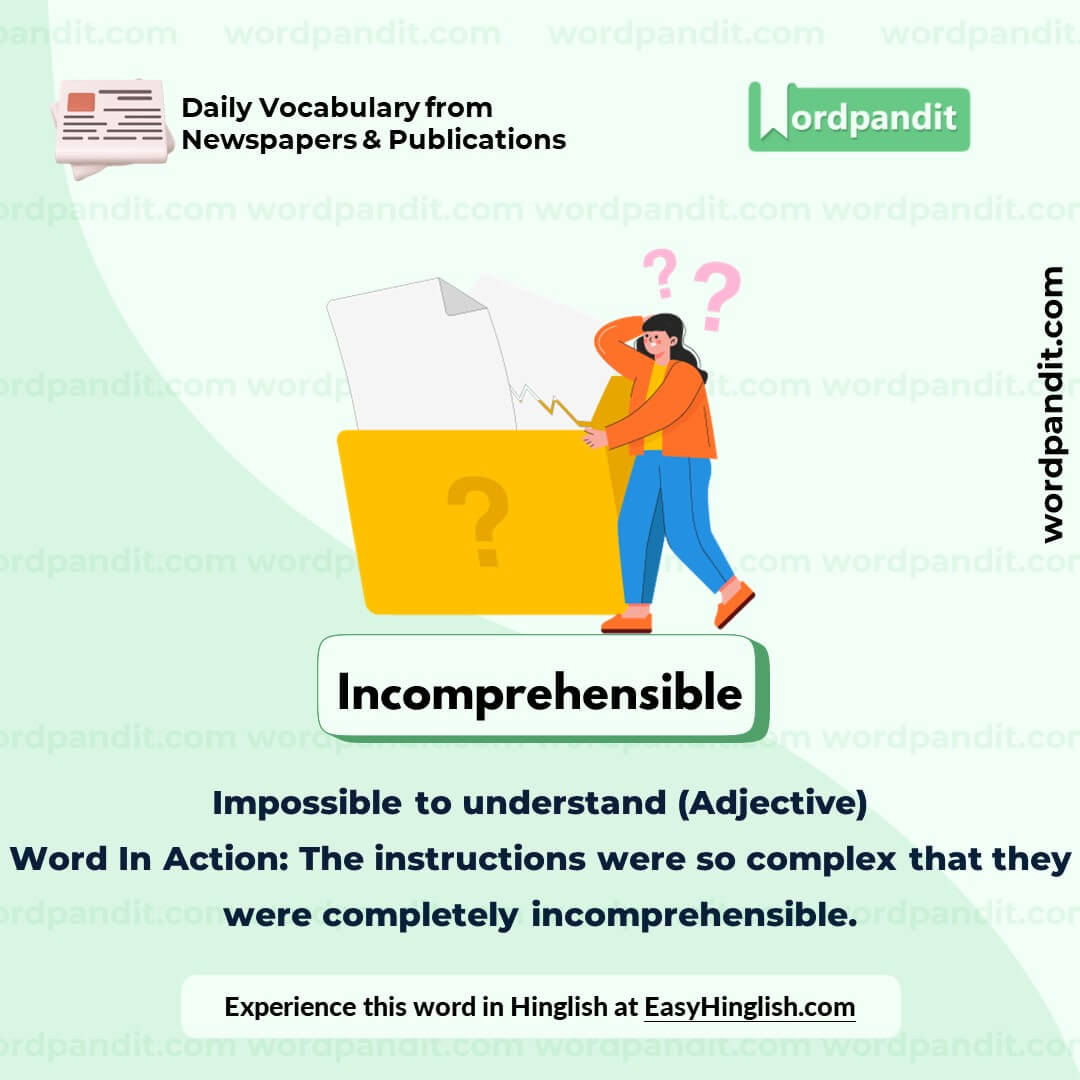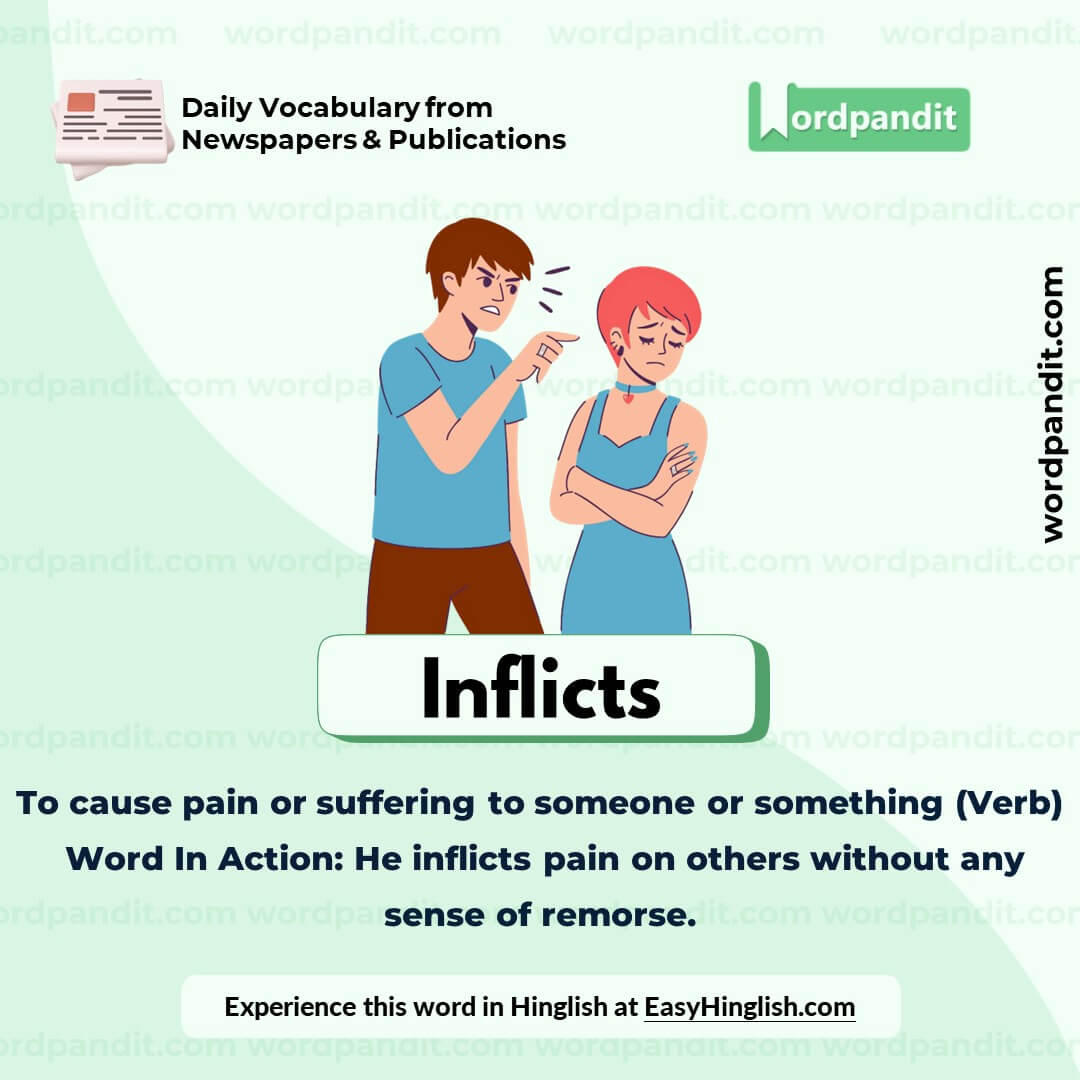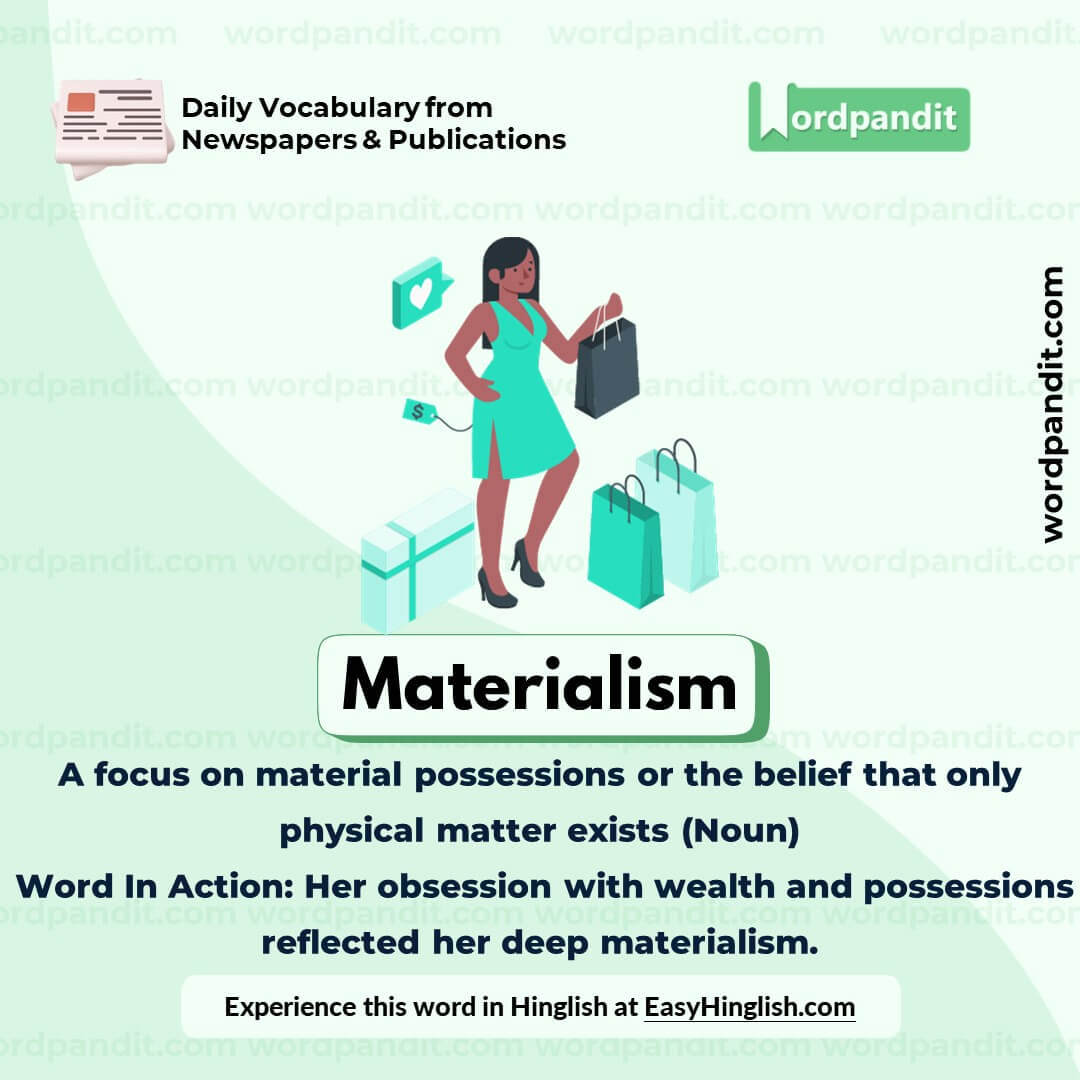Daily Vocabulary from International Newspapers and Publications
Expand Your Vocabulary with Wordpandit’s Global Vocabulary Hub
At Wordpandit, we are committed to helping you develop a truly global vocabulary by drawing from some of the most respected international publications. This section is designed to keep you ahead of the curve by introducing you to words that define global conversations and trends.
The Power of Global Sources
To help you think and communicate on a global scale, we curate vocabulary from renowned international sources, such as:
- The New York Times
- The Washington Post
- BBC
- The Guardian
- The Economist
- Scientific American
- Psychology Today
- And many more...
Stay Global, Stay Competitive
Our daily updates from international publications ensure you are consistently exposed to new words that reflect global news and developments, making sure your vocabulary is not only current but also globally relevant.
Enhance Your Global Perspective
Whether you’re preparing for international exams, aiming to excel in global business communication, or want to enhance your language skills for personal growth, Wordpandit offers the resources you need to thrive in a global context.
Effective Learning, Global Reach
Our learning methodology combines global examples, memory aids, and interactive activities, allowing you to internalize new words effectively and apply them in real-world scenarios.
Begin Your Global Vocabulary Journey Now!
Why Choose Wordpandit?
Practical Learning: Focus on words you'll actually encounter in real-world reading, enhancing your comprehension and communication skills.
Diverse Content: From current affairs to scientific breakthroughs, our varied sources expose you to vocabulary across multiple domains.
Effortless Integration: Make Wordpandit a part of your daily routine. Just a few minutes each day can significantly boost your lexicon over time.
Your Path to Vocabulary Mastery
- Visit our Daily Vocabulary section regularly
- Explore new words and their usage in context
- Practice incorporating these words into your own writing and speech
- Track your progress as your vocabulary expands
Start Your Journey Today
Embark on your vocabulary enhancement journey with Wordpandit. By consistently engaging with our daily posts, you'll build a robust vocabulary that serves you well in academic, professional, and personal contexts.
Remember, a word a day keeps linguistic limitations at bay. Make Wordpandit your daily companion in the quest for vocabulary excellence!
WORD-1: Incomprehensible
Context:
"Despite his strenuous efforts to exercise care in his use of language, Bohr could be notoriously vague and more than occasionally incomprehensible." - Aeon
Explanatory Paragraph:
The word "incomprehensible" describes something that is impossible or very difficult to understand. It often refers to abstract ideas, convoluted explanations, or complex expressions that defy clarity or understanding.
Meaning: Impossible to understand (Adjective)
Pronunciation: in-kom-pruh-HEN-suh-buhl
Difficulty Level: ⭐⭐⭐ Intermediate
Etymology: Originates from the Latin word "incomprehensibilis," meaning "not understandable," which combines "in-" (not) with "comprehensibilis" (understandable).
Synonyms & Antonyms:
Synonyms: unintelligible, unclear, obscure, inscrutable
Antonyms: understandable, clear, lucid, intelligible
Usage Examples:
- The speaker's explanation was so complex that it became incomprehensible to the audience.
- She stared at the incomprehensible equation on the whiteboard, wondering how anyone could solve it.
- The novel's plot was so convoluted that many readers found it utterly incomprehensible.
- The ancient text contained symbols and writings that were incomprehensible to modern archaeologists.
Cultural Reference:
"Incomprehensibility" often emerges in discussions of quantum mechanics, where concepts like superposition and entanglement challenge our everyday understanding of reality. - General Science Discourse
Think About It:
Why do you think some ideas or explanations are inherently incomprehensible? Is it due to the complexity of the subject or the way it is communicated?
Quick Activity:
Write a sentence using "incomprehensible" to describe a challenging concept or experience. Then, rewrite the sentence to make it simpler and more comprehensible.
Memory Tip:
Think of "incomprehensible" as "in (not) + comprehend (understand)." If something is incomprehensible, it’s "not able to be comprehended."
Real-World Application:
The term "incomprehensible" is often used in academic and professional settings to critique overly complex documents, dense academic papers, or poorly structured presentations.
WORD-2: Inflicts
Context:
"Damage each year and inflicts its agonising bite on millions of people. But the largest colonies, and most dramatic moments in the global spread of ant societies," - Aeon
Explanatory Paragraph:
The word "inflicts" refers to the act of causing harm, pain, or suffering to someone or something. It is often used in the context of negative actions or consequences imposed deliberately or naturally, such as wounds, punishment, or damage.
Meaning: To cause pain or suffering to someone or something (Verb)
Pronunciation: in-FLIKS
Difficulty Level: ⭐⭐ Beginner
Etymology: Derived from the Latin word "inflictus," which is the past participle of "infligere," meaning "to strike against or impose."
Synonyms & Antonyms:
Synonyms: impose, administer, deliver, exact
Antonyms: relieve, heal, alleviate, comfort
Usage Examples:
- The storm inflicts significant damage on coastal communities every year.
- His harsh words inflicted emotional pain on his friend.
- The new policy inflicts financial burdens on low-income families.
- A venomous snake bite inflicts severe pain and requires immediate medical attention.
Cultural Reference:
"Inflicts" is commonly used in literature and media to describe the impact of villains, natural disasters, or wars, showcasing the dramatic consequences of actions or events. For instance, Shakespeare often describes how betrayal inflicts wounds deeper than physical harm. - Classic Literature Analysis
Think About It:
Is it possible to inflict harm unintentionally? How does intent change the perception of inflicted pain or damage?
Quick Activity:
Think of a recent news story where harm was inflicted (natural disaster, accident, or conflict). Write a short paragraph summarizing how and why the harm was inflicted.
Memory Tip:
Remember "inflicts" by thinking of "in (towards) + flict (strike)." It’s about striking harm towards someone or something.
Real-World Application:
"Inflicts" is often used in discussions about the consequences of actions, such as the impact of policies, natural disasters, or personal behavior, making it a versatile word in professional and everyday contexts.
WORD-3: Aristotelian
Context:
"In other words, he traced the intellectual origins of the foundation of the United States as far back as the ancient Aristotelian ideal of citizenship and Florentine civic humanism." - Aeon
Explanatory Paragraph:
"Aristotelian" relates to the teachings and philosophy of Aristotle, a Greek philosopher who made significant contributions to logic, ethics, politics, and more. The term is often used to describe ideas, frameworks, or systems of thought rooted in Aristotle's work, emphasizing logic, observation, and the pursuit of virtue in personal and civic life.
Meaning: Pertaining to the philosophy or teachings of Aristotle (adjective).
Pronunciation: ar-uh-stuh-TEE-lee-uhn
Difficulty Level: ⭐⭐⭐ Advanced
Etymology: Derived from the name "Aristotle," a renowned ancient Greek philosopher, combined with the suffix "-ian," denoting belonging or relation.
Synonyms & Antonyms:
Synonyms: Peripatetic, Aristotelean
Antonyms: Non-philosophical, Anti-Aristotelian
Usage Examples:
- The professor's lecture on ethics heavily emphasized Aristotelian principles of virtue and morality.
- The constitution's framework reflects an Aristotelian approach to governance and civic responsibility.
- Her dissertation explored Aristotelian logic as a foundation for modern computational algorithms.
- In debates, he often used Aristotelian rhetoric to structure his arguments logically.
Cultural Reference:
"Aristotle's influence extended through the Renaissance and Enlightenment periods, shaping Western thought and ideals of citizenship." - Encyclopedia of Philosophy
Think About It:
How might Aristotelian ideals of citizenship apply to modern democratic societies?
Quick Activity:
Identify one concept from Aristotle's philosophy and write a short paragraph explaining how it could solve a contemporary problem.
Memory Tip:
Remember "Aristotelian" by associating it with "Aristotle" and his key idea of achieving balance or the golden mean in life.
Real-World Application:
Aristotelian logic underpins many academic disciplines, including science, ethics, and political theory, and provides a foundation for rational decision-making and problem-solving.
WORD-4: Dunking
Context:
"Nostrils in such numbers that they could be dislodged only by repeatedly dunking the infant in water." - Aeon
Explanatory Paragraph:
The word "dunking" refers to the act of submerging something briefly into a liquid, often by dipping it in and pulling it out quickly. It is commonly associated with actions like dipping food into a drink or immersing an object or person into water.
Meaning: The act of immersing something briefly into a liquid (Noun/Verb)
Pronunciation: DUHN-king
Difficulty Level: ⭐⭐ Beginner
Etymology: Derived from the Middle English "dunken," which means "to immerse or soak," and has roots in Old High German "dunkōn."
Synonyms & Antonyms:
Synonyms: dip, submerge, immerse, plunge
Antonyms: dry, lift, withdraw, extract
Usage Examples:
- He enjoyed dunking his cookies into his glass of milk.
- The basketball player impressed the crowd by dunking the ball with great force.
- The rescue worker saved the kitten by dunking it in warm water to clean off the mud.
- She kept dunking the tea bag until the color was just right for her taste.
Cultural Reference:
"Dunking" is popular in sports terminology, especially in basketball, where it describes a player forcefully pushing the ball through the hoop, often regarded as a display of skill and power. - Sports Culture
Think About It:
Why do certain actions, like dunking in sports or cooking, gain such cultural or symbolic importance in different fields?
Quick Activity:
Think of three different situations where the word "dunking" can be used (e.g., in sports, food, or everyday activities). Write a sentence for each context.
Memory Tip:
Picture yourself dunking a biscuit into tea—this common, vivid image helps recall the act of submerging something briefly.
Real-World Application:
"Dunking" finds applications in food preparation, cleaning techniques, sports, and even biology or medicine when immersing objects or specimens in liquid for study or cleaning purposes.
WORD-5: Materialism
Context:
"When quantum mechanics posed a threat to the Marxist doctrine of materialism, communist physicists sought to reconcile the two." - Aeon
Explanatory Paragraph:
The word "materialism" refers to a philosophy or attitude that places importance on physical, tangible things over spiritual or intellectual concerns. In a broader sense, it can describe an economic or cultural focus on acquiring wealth and possessions, or in philosophical terms, the belief that only material things truly exist.
Meaning: A focus on material possessions or the belief that only physical matter exists (Noun)
Pronunciation: muh-TEER-ee-uh-liz-uhm
Difficulty Level: ⭐⭐⭐ Intermediate
Etymology: Derived from the Latin word "materialis," meaning "of matter," with roots in the 17th century as a term in philosophy.
Synonyms & Antonyms:
Synonyms: consumerism, physicalism, pragmatism
Antonyms: idealism, spiritualism, asceticism
Usage Examples:
- The philosopher argued against materialism, advocating for a more spiritual perspective on life.
- Her materialism was evident in her constant pursuit of luxury goods and wealth.
- The scientific theory aligned with materialism, suggesting that all phenomena can be explained by physical matter.
- Critics often associate materialism with the decline of traditional values in modern society.
Cultural Reference:
"Materialism" plays a significant role in Karl Marx's philosophy, where historical materialism analyzes the development of societies through their economic and material foundations. - Political Philosophy
Think About It:
Is materialism a necessary part of human progress, or does it lead to a loss of deeper values and connections? How do you balance material needs with spiritual or emotional well-being?
Quick Activity:
Write a short paragraph comparing materialism and idealism. How do these opposing philosophies shape the way people view the world?
Memory Tip:
Remember "materialism" by associating it with "materials," as it emphasizes the importance of physical and tangible things over abstract ideas.
Real-World Application:
Materialism is a critical concept in understanding consumer behavior, economic policies, and even philosophical debates about the nature of existence and human priorities.
















